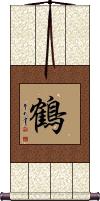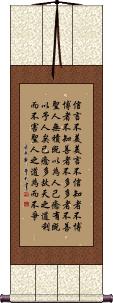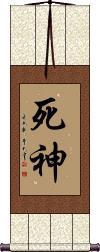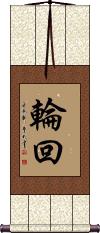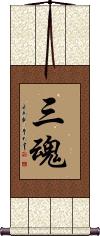Many custom options...
And formats...

Souls in Chinese / Japanese...
Buy a Souls calligraphy wall scroll here!
Personalize your custom “Souls” project by clicking the button next to your favorite “Souls” title below...
Crane
Graceful bird of longevity
鶴 is a famous bird of China.
Known in China to be a very spiritual creature, the crane is a symbol of both longevity and the journey of the souls and spirits of ancestors.
Note: 鶴 can mean crane or stork in Japanese.
Daodejing / Tao Te Ching - Chapter 81
信言不美美言不信知者不博博者不知善者不多多者不善聖人無積既以為人己癒有既以予人矣已癒多故天之道利而不害聖人之道為而不爭 is the Mawangdui version of Daodejing chapter 81.
Credible words are not eloquent;
Eloquent words are not credible.
The wise are not erudite;
The erudite are not wise.
The adept are not all-around;
The all-around are not adept.
The sages do not accumulate things.
Yet the more they have done for others,
The more they have gained themselves;
The more they have given to others,
The more they have gotten themselves.
Thus, the way of tian (heaven) is to benefit without harming;
The way of sages is to do without contending.
Sincere words are not showy;
showy words are not sincere.
Those who know are not “widely learned";
those “widely learned” do not know.
The good do not have a lot;
Those with a lot are not good.
The Sage accumulates nothing.
Having used what he had for others,
he has even more.
Having given what he had to others,
what he has is even greater.
Therefore, the Way of Heaven is to benefit and not cause any harm,
The Way of Man is to act on behalf of others and not to compete with them.
True words aren't charming,
charming words aren't true.
Good people aren't contentious,
contentious people aren't good.
People who know aren't learned,
learned people don't know.
Wise souls don't hoard;
the more they do for others the more they have,
the more they give the richer they are.
The Way of heaven provides without destroying.
Doing without outdoing
is the Way of the wise.
Grim Reaper / God of Death
死神 is the title of the mythological figure (often called the Grim Reaper in western culture) in charge of taking the souls of those who die.
This title can be translated directly as “god of death” or “spirit of death.” The first character literally means “death,” and the second means “spirit” or “god.”
死神 is a very strange title for a calligraphy wall scroll. I'm not even sure if my calligraphers will write it, as it has some bad superstitious feelings attached to it.
Reincarnation / Transmigration of Souls
輪回 is a universal word in Japanese and Chinese that expresses the Buddhist idea of “reincarnation,” “transmigration of souls,” or “the eternal cycle of birth and death.”
In some contexts, this can also mean “karma,” and others will say it represents “samsara.”
The first character means wheel, ring, turn, circle, loop, or rotate.
The second character can be thought of as a suffix meaning “-times.” This second character can also refer to something that revolves, returns, goes back, or is a counter of the number of occurrences of some event.
Together the sum supersedes the parts, and it means reincarnation. But knowing the essence of each character may help you understand some of the meaning behind the word.
![]() Shown to the right is the more common way to write the second character in Japanese.
it’s
an alternate form of this character in Chinese (so neither way is technically wrong in either language). If you select a Japanese calligrapher, expect that is will look like the Kanji to the right.
Shown to the right is the more common way to write the second character in Japanese.
it’s
an alternate form of this character in Chinese (so neither way is technically wrong in either language). If you select a Japanese calligrapher, expect that is will look like the Kanji to the right.
Three Souls
This in-stock artwork might be what you are looking for, and ships right away...
Not the results for souls that you were looking for?
Below are some entries from our dictionary that may match your souls search...
| Characters If shown, 2nd row is Simp. Chinese |
Pronunciation Romanization |
Simple Dictionary Definition |
三魂 see styles |
sān hún san1 hun2 san hun |
More info & calligraphy: Three Souls |
死神 see styles |
sǐ shén si3 shen2 ssu shen shinigami しにがみ |
More info & calligraphy: Grim Reaper / God of Deathgod of death; Death |
無我 无我 see styles |
wú wǒ wu2 wo3 wu wo muga むが |
More info & calligraphy: Selflessness(1) selflessness; self-effacement; self-renunciation; (2) {Buddh} anatta; anatman; doctrine that states that humans do not possess souls; (female given name) Muga anātman; nairātmya; no ego, no soul (of an independent and self-contained character), impersonal, no individual independent existence (of conscious or unconscious beings, anātmaka). The empirical ego is merely an aggregation of various elements, and with their disintegration it ceases to exist; therefore it has nm ultimate reality of its own, but the Nirvāṇa Sūtra asserts the reality of the ego in the transcendental realm. The non-Buddhist definition of ego is that it has permanent individuality 常一之體 and is independent or sovereign 有主宰之用. When applied to men it is 人我, when to things it is 法我. Cf. 常 11. |
醮 see styles |
jiào jiao4 chiao shō |
to perform sacrifice Libations or offerings, especially to ancestors; the offerings of All Souls' Day v. 盂 8; emptied, finished. |
七魄 see styles |
qī pò qi1 po4 ch`i p`o chi po |
seven mortal forms in Daoism, representing carnal life and desires; contrasted with 三魂 three immortal souls |
倒懸 倒悬 see styles |
dào xuán dao4 xuan2 tao hsüan touken / token とうけん |
lit. to hang upside down; fig. in dire straits hanging (someone) upside down Hanging upside down; the condition of certain condemned souls, especially for whom the Ullambana (or Lambana, cf. 盂) festival is held in the seventh month; the phrase is used as a tr. of Ullambana, and as such seems meant for Lambana. |
咒願 咒愿 see styles |
zhòu yuàn zhou4 yuan4 chou yüan jugan |
Vows, prayers, or formulas uttered in behalf of donors, or of the dead; especially at the All Souls Day's offerings to the seven generations of ancestors. Every word and deed of a bodhisattva should be a dhāraṇī. |
地藏 see styles |
dì zàng di4 zang4 ti tsang jizou / jizo じぞう |
Kṣitigarbha, the Bodhisattva of the Great Vow (to save all souls before accepting Bodhi); also translated Earth Treasury, Earth Womb, or Earth Store Bodhisattva (surname) Jizou Ti-tsang, J. Jizō, Kṣitigarbha, 乞叉底蘗沙; Earth-store, Earth-treasury, or Earthwomb. One of the group of eight Dhvani- Bodhisattvas. With hints of a feminine origin, he is now the guardian of the earth. Though associated with Yama as overlord, and with the dead and the hells, his role is that of saviour. Depicted with the alarum staff with its six rings, he is accredited with power over the hells and is devoted to the saving of all creatures between the nirvana of Śākyamuni and the advent of Maitreya the fifth century he has been especially considered as the deliverer from the hells. His central place in China is at Chiu-hua-shan, forty li south-west of Ch'ing-yang in Anhui. In Japan he is also the protector of travellers by land and his image accordingly appears on the roads; bereaved parents put stones by his images to seek his aid in relieving the labours of their dead in the task of piling stones on the banks of the Buddhist Styx; he also helps women in labour. He is described as holding a place between the gods and men on the one hand and the hells on the other for saving all in distress; some say he is an incarnation of Yama. At dawn he sits immobile on the earth 地 and meditates on the myriads of its beings 藏. When represented as a monk, it may be through the influence of a Korean monk who is considered to be his incarnation, and who came to China in 653 and died in 728 at the age of 99 after residing at Chiu-hua-shan for seventy-five years: his body, not decaying, is said to have been gilded over and became an object of worship. Many have confused 眞羅 part of Korea with 暹羅 Siam. There are other developments of Ti-tsang, such as the 六地藏 Six Ti-tsang, i. e. severally converting or transforming those in the hells, pretas, animals, asuras, men, and the devas; these six Ti-tsang have different images and symbols. Ti-tsang has also six messengers 六使者: Yama for transforming those in hell; the pearl-holder for pretas; the strong one or animals; the devīof mercy for asuras; the devī of the treasure for human beings; one who has charge of the heavens for the devas. There is also the 延命地藏 Yanming Ti-tsang, who controls length of days and who is approached, as also may be P'u-hsien, for that Purpose; his two assistants are the Supervisors of good and evil 掌善 and 掌惡. Under another form, as 勝軍地藏 Ti-tsang is chiefly associated with the esoteric cult. The benefits derived from his worship are many, some say ten, others say twenty-eight. His vows are contained in the 地藏菩薩本願經. There is also the 大乘大集地藏十電經 tr. by Xuanzang in 10 juan in the seventh century, which probably influenced the spread of the Ti-tsang cult. |
孟婆 see styles |
mèng pó meng4 po2 meng p`o meng po |
(Chinese folk religion) Meng Po, goddess who gives a potion to souls before they are reincarnated, which makes them forget their previous life; (Chinese folk religion) Meng Po, goddess of the wind |
岱宗 see styles |
dài zōng dai4 zong1 tai tsung |
another name for Mt Tai 泰山 in Shandong as principal or ancestor of the Five Sacred Mountains 五嶽|五岳[Wu3 yue4]; Mt Tai as resting place for departed souls |
數論 数论 see styles |
shù lùn shu4 lun4 shu lun Suron |
number theory (math.) The śāstras of the Sarvāstivādins; also Kaplila, called數論外道; 數論師 founder of the Sāṅkhyā philosophy; v. 僧伽, 劫, and 迦. It is an attempt to place all concepts in twenty-five categories, with puruṣa at the head and the others in ordered progress. Inter alia it also teaches 'the eternity and multiplicity of souls' (Eitel). Vasubandhu wrote in criticism of the system. |
有靈 有灵 see styles |
yǒu líng you3 ling2 yu ling uryō |
Having souls, sentient beings, similar to 有情; possessing magical or spiritual powers. |
生霊 see styles |
seirei / sere せいれい ikiryou / ikiryo いきりょう ikisudama いきすだま |
(1) vengeful spirit (spawned from a person's hate); doppelganger; co-walker; wraith; (2) mankind; souls; people; (out-dated or obsolete kana usage) vengeful spirit (spawned from a person's hate); doppelganger; co-walker; wraith |
白中 see styles |
bái zhōng bai2 zhong1 pai chung byakuchū |
All Souls' Day |
百中 see styles |
bǎi zhōng bai3 zhong1 pai chung momonaka ももなか |
(surname) Momonaka All Souls' Day |
盆會 盆会 see styles |
pén huì pen2 hui4 p`en hui pen hui bon'e |
The All-Souls anniversary, v. 盂. |
神鬼 see styles |
shén guǐ shen2 gui3 shen kuei shinki しんき |
(1) gods and demons; divine spirits and souls of the dead; (2) one with (spiritual) power beyond that of humans; (3) (See 鬼神・きしん) fierce god spirits |
臘佛 腊佛 see styles |
là fó la4 fo2 la fo rōbutsu |
The offerings to Buddha after the summer retreat, maintained on the 15th day of the 7th month; also All Souls' Day, v. 盂 8; the臘餠 annual cakes are then offered and eaten. |
色魔 see styles |
sè mó se4 mo2 se mo shikima しきま |
sex fiend; molester; sex attacker; sex demon (a spirit that enters people's souls and makes them desire sex) sex maniac; seducer; libertine; Lothario; rake; (surname) Shikama |
金札 see styles |
kinsatsu きんさつ |
(1) golden label; golden protective talisman; (2) (hist) kinsatsu (Edo-period paper money); (3) (hist) kinsatsu (early Meiji-period paper money); (4) (See 鉄札・2,閻魔) golden tablet belonging to Yama that is inscribed with the names of souls to be sent to paradise; (surname) Kanefuda |
鉄札 see styles |
tessatsu てっさつ |
(1) rectangular iron plate; (2) {Buddh} (See 金札・4,閻魔) iron tablet belonging to Yama that is inscribed with the names of souls to be sent to hell |
鬼錄 鬼录 see styles |
guǐ lù gui3 lu4 kuei lu |
The iron record, containing the sins of men, in Yama's office in Hades. |
万霊祭 see styles |
banreisai / banresai ばんれいさい |
All Souls' Day |
万霊節 see styles |
banreisetsu / banresetsu ばんれいせつ |
All Souls' Day |
不來迎 不来迎 see styles |
bù lái yíng bu4 lai2 ying2 pu lai ying fu raigō |
Without being called he comes to welcome; the Pure-land sect believes that Amitābha himself comes to welcome departing souls of his followers on their calling upon him, but the 淨土眞宗 (Jōdo Shin-shu sect) teaches that belief in him at any time ensures rebirth in the Pure Land, independently of calling on him at death. |
孟婆湯 孟婆汤 see styles |
mèng pó tāng meng4 po2 tang1 meng p`o t`ang meng po tang |
potion given to souls by Meng Po 孟婆[Meng4 po2] before they are reincarnated, which makes them forget their previous life |
彭養鷗 彭养鸥 see styles |
péng yǎng ōu peng2 yang3 ou1 p`eng yang ou peng yang ou |
Peng Yangou, late Qing novelist, author of Black register of lost souls 黑籍冤魂 |
歡喜會 欢喜会 see styles |
huān xǐ huì huan1 xi3 hui4 huan hsi hui kangi e |
The festival of All Souls, v. 盂. |
火の車 see styles |
hinokuruma ひのくるま |
(exp,n) (1) {Buddh} (See 火車・1) fiery chariot (that carries the souls of sinners into hell); (exp,n) (2) (idiom) desperate financial situation; dire straits |
盂蘭盆 盂兰盆 see styles |
yú lán pén yu2 lan2 pen2 yü lan p`en yü lan pen urabon うらぼん |
see 盂蘭盆會|盂兰盆会[Yu2 lan2 pen2 hui4] Bon festival (Buddhist ceremony held around July 15); Feast of Lanterns (盂蘭); 鳥藍婆 (鳥藍婆拏) ullambana 盂蘭 may be another form of lambana or avalamba, "hanging down," "depending," "support"; it is intp. "to hang upside down", or "to be in suspense", referring to extreme suffering in purgatory; but there is a suggestion of the dependence of the dead on the living. By some 盆 is regarded as a Chinese word, not part of the transliteration, meaning a vessel filled with offerings of food. The term is applied to the festival of All Souls, held about the 15th of the 7th moon, when masses are read by Buddhist and Taoist priests and elaborate offerings made to the Buddhist Trinity for the purpose of releasing from purgatory the souls of those who have died on land or sea. The Ullambanapātra Sutra is attributed to Śākyamuni, of course incorrectly; it was first tr. into Chinese by Dharmaraksha, A.D. 266-313 or 317; the first masses are not reported until the time of Liang Wudi, A.D. 538; and were popularized by Amogha (A.D. 732) under the influence of the Yogācārya School. They are generally observed in China, but are unknown to Southern Buddhism. The "idea of intercession on the part of the priesthood for the benefit of" souls in hell "is utterly antagonistic to the explicit teaching of primitive Buddhism'" The origin of the custom is unknown, but it is foisted on to Śākyamuni, whose disciple Maudgalyāyana is represented as having been to purgatory to relieve his mother's sufferings. Śākyamuni told him that only the united efforts of the whole priesthood 十方衆會 could alleviate the pains of the suffering. The mere suggestion of an All Souls Day with a great national day for the monks is sufficient to account for the spread of the festival. Eitel says: "Engrafted upon the narrative ancestral worship, this ceremonial for feeding the ghost of deceased ancestors of seven generations obtained immense popularity and is now practised by everybody in China, by Taoists even and by Confucianists." All kinds of food offerings are made and paper garments, etc., burnt. The occasion, 7th moon, 15th day, is known as the盂蘭會 (or 盂蘭盆會 or 盂蘭齋 or 盂蘭盆齋) and the sutra as 盂蘭經 (or 盂蘭盆經). |
Click here for more souls results from our dictionary
The following table may be helpful for those studying Chinese or Japanese...
| Title | Characters | Romaji (Romanized Japanese) | Various forms of Romanized Chinese | |
| Crane | 鶴 鹤 | gaku / tsuru | hè / he4 / he | ho |
| Daodejing Tao Te Ching - Chapter 81 | 信言不美美言不信知者不博博者不知善者不多多者不善聖人無積既以為人己癒有既以予人矣已癒多故天之道利而不害聖人之道為而不爭 信言不美美言不信知者不博博者不知善者不多多者不善圣人无积既以为人己愈有既以予人矣已愈多故天之道利而不害圣人之道为而不争 | |||
| Grim Reaper God of Death | 死神 | shinigami | sǐ shén / si3 shen2 / si shen / sishen | ssu shen / ssushen |
| Reincarnation Transmigration of Souls | 輪回 / 輪廻 轮回 | rin ne / rinne | lún huí / lun2 hui2 / lun hui / lunhui | |
| Three Souls | 三魂 | san tamashi santamashi | sān hún / san1 hun2 / san hun / sanhun | |
| In some entries above you will see that characters have different versions above and below a line. In these cases, the characters above the line are Traditional Chinese, while the ones below are Simplified Chinese. | ||||
Successful Chinese Character and Japanese Kanji calligraphy searches within the last few hours...
